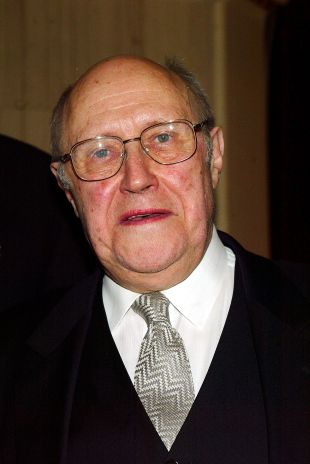Mstislav Rostropovich was one of the great cellists, and one of the leading conductors, of his time. His performances in both arenas were characterized by a direct and strongly emotional style, and the often turbulent events of his life, including exile from his native Soviet Union, often resonated with his music-making. His father, Leopold, was an acclaimed cellist and his mother was a professional pianist. In 1931, the family returned to Moscow, where Leopold taught at the Gnesin Institute. Taught by his father from the age of three, "Slava" gave his first recital at eight. He entered the Central Music School in 1939, remaining until 1941. In 1943 he entered the Moscow Conservatory. He studied cello with Semyon Kozolupov and composition with Vissarion Shebalin and Dmitry Shostakovich. He became a musical secretary to composer Sergey Prokofiev, and helped persuade the composer to rewrite his failed cello concerto in E minor as the Symphony-Concerto for Cello and Orchestra, Op. 125, one of the major masterpieces for the instrument.
Rostropovich won the International Competition for Cellists in Prague in 1950, and began to concertize throughout Russia. His first appearance in the West was in Florence in 1951. He married Galina Vishnevskaya, the star soprano of the Bolshoi Opera. The couple found themselves at odds with the authorities for the first time, since she was then being amorously pursued by Soviet president Nikolai Bulganin, who canceled their long-planned 1956 tour of the West. But Bulganin was losing power to Party Secretary Khrushchev, and the tour was reinstated, allowing Rostropovich to debut in London at the Festival Hall in March and at Carnegie Hall in New York in April. He was immediately hailed as a great international star.
Returning to the U.S.S.R., Rostropovich found composers clamoring to write for him. The greatest of them, Shostakovich, wrote both his cello concertos for Rostropovich. When the cellist brought the first concerto to the West for the first time, he premiered it on LP in a magnificent recording with Eugene Ormandy and the Philadelphia Orchestra, beginning a great discography of Western recordings. On the same tour, English composer Benjamin Britten attended the London premiere of the concerto, initiating another great musical friendship with Rostropovich that led to Britten writing five masterpieces for the cello (three solo suites, a sonata, and the Cello Symphony) and a song cycle for Galina.
In 1969, Rostropovich protested official mistreatment of the writer Alexander Solzhenitsyn in a letter that circulated in the West, embarrassing Soviet officials. Rostropovich and Vishnevskaya saw their scheduled concerts suddenly canceled, and the soprano was expelled from the Bolshoi roster. In 1974 the government granted their request to visit the West for two years, then exiled them by revoking their Soviet citizenship. Rostropovich became invisible at home, but a major star in the West. He bought the famous "Duport" Stradivarius. In September, he made a London conducting debut with the New Philharmonic Orchestra and in March debuted with the National Symphony Orchestra of Washington, D.C. He was appointed its music director in 1977.
In 1990, Soviet president Gorbachev reversed Rostropovich's expulsion, resulting in an emotional return documented in the film Soldiers of Music. When Russian president Boris Yeltsin stood up to Soviet military power, Rostropovich rushed to stand beside him in the events that led to the collapse of Soviet power. He then stepped down from leadership of the Washington orchestra, but appeared as cellist and conductor around the world. He made his first recordings of Bach's six cello suites in 1996, the result of a lifetime of study -- underscoring his status, once again, as a major force in inspiring new cello works from the great composers of his time.
Cinematically, Rostropovich neither appeared in nor scored a mainstream feature film, but when he died in Moscow on April 27, 2007 (of unspecified causes, exactly one month after his 80th birthday), he left behind a virtual treasure trove of performance films. While this body of work fails to outstrip that of other conductors in size and breadth, it should at least satisfy the casual Rostropovich devotee. The list is obviously too exhaustive to include here in full, but it encompasses both orchestral works that showcase the artist's cello skills (such as the 1991 Rostropovich: Bach -- Cello Suites and the 2004 Placido Domingo with Mstislav Rostropovich: Gala Performance) and operatic works that feature the maestro conducting, such at Andrzej Zulawski's 1989 Boris Godunov.
